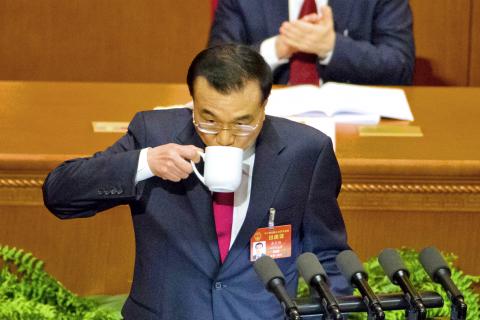China will firmly oppose Taiwanese “separatism,” Chinese Premier Li Keqiang (李克強) said yesterday, following tension with US President Donald Trump over Taiwan, and said that Hong Kong independence moves would “lead nowhere.”
“We will resolutely oppose and contain separatist activities for Taiwan independence,” Li said in a speech opening the annual session of China’s National People’s Congress (NPC) in Beijing.
“We will never tolerate any activity, in any form or name, which attempts to separate Taiwan from the motherland,” he said.

Photo: AP
China will protect national sovereignty and territorial integrity while safeguarding peace and stability, he said.
However, Li extended the usual cautious olive branch across the Taiwan Strait, saying that China would continue efforts to increase linkages with Taiwan, which have included rising cross-strait investment, daily direct flights and increased tourism.
“People on both sides of the Taiwan Strait should keep in mind the greater interests of the nation,” and work toward the “reunification of China,” he said.
In Taipei, the Mainland Affairs Council said the government’s policy to continue and promote peaceful and stable cross-strait development remains unchanged, adding that China should respect and understand Taiwan’s democracy.
Saying peace and stability across the Strait is a mutual responsibility, the council called on the Chinese government to consider the welfare of the people as its priority in policymaking, and reduce maneuvering for political benefit.
Li also shut down any hope of Hong Kong independence.
“The notion of Hong Kong independence will lead nowhere,” he said, adding that Beijing would ensure that the principle of “one country, two systems” is applied in Hong Kong and Macau “without being bent or distorted.”
Li’s annual report to the highly choreographed congress is akin to a state-of-the-nation address highlighting key government priorities for the year, which are then typically parroted in subsequent delegate meetings.
Trump raised eyebrows following his election victory in November last year with a protocol-busting telephone conversation with President Tsai Ing-wen (蔡英文) and later threw doubt on the US “one China” policy, suggesting that the decades-old diplomatic formulation was up for negotiation.
The 10-day NPC session runs until March 15.
Additional reporting by Lin Liang-sheng

US President Donald Trump yesterday announced sweeping "reciprocal tariffs" on US trading partners, including a 32 percent tax on goods from Taiwan that is set to take effect on Wednesday. At a Rose Garden event, Trump declared a 10 percent baseline tax on imports from all countries, with the White House saying it would take effect on Saturday. Countries with larger trade surpluses with the US would face higher duties beginning on Wednesday, including Taiwan (32 percent), China (34 percent), Japan (24 percent), South Korea (25 percent), Vietnam (46 percent) and Thailand (36 percent). Canada and Mexico, the two largest US trading

AIR SUPPORT: The Ministry of National Defense thanked the US for the delivery, adding that it was an indicator of the White House’s commitment to the Taiwan Relations Act Deputy Minister of National Defense Po Horng-huei (柏鴻輝) and Representative to the US Alexander Yui on Friday attended a delivery ceremony for the first of Taiwan’s long-awaited 66 F-16C/D Block 70 jets at a Lockheed Martin Corp factory in Greenville, South Carolina. “We are so proud to be the global home of the F-16 and to support Taiwan’s air defense capabilities,” US Representative William Timmons wrote on X, alongside a photograph of Taiwanese and US officials at the event. The F-16C/D Block 70 jets Taiwan ordered have the same capabilities as aircraft that had been upgraded to F-16Vs. The batch of Lockheed Martin

GRIDLOCK: The National Fire Agency’s Special Search and Rescue team is on standby to travel to the countries to help out with the rescue effort A powerful earthquake rocked Myanmar and neighboring Thailand yesterday, killing at least three people in Bangkok and burying dozens when a high-rise building under construction collapsed. Footage shared on social media from Myanmar’s second-largest city showed widespread destruction, raising fears that many were trapped under the rubble or killed. The magnitude 7.7 earthquake, with an epicenter near Mandalay in Myanmar, struck at midday and was followed by a strong magnitude 6.4 aftershock. The extent of death, injury and destruction — especially in Myanmar, which is embroiled in a civil war and where information is tightly controlled at the best of times —

China's military today said it began joint army, navy and rocket force exercises around Taiwan to "serve as a stern warning and powerful deterrent against Taiwanese independence," calling President William Lai (賴清德) a "parasite." The exercises come after Lai called Beijing a "foreign hostile force" last month. More than 10 Chinese military ships approached close to Taiwan's 24 nautical mile (44.4km) contiguous zone this morning and Taiwan sent its own warships to respond, two senior Taiwanese officials said. Taiwan has not yet detected any live fire by the Chinese military so far, one of the officials said. The drills took place after US Secretary